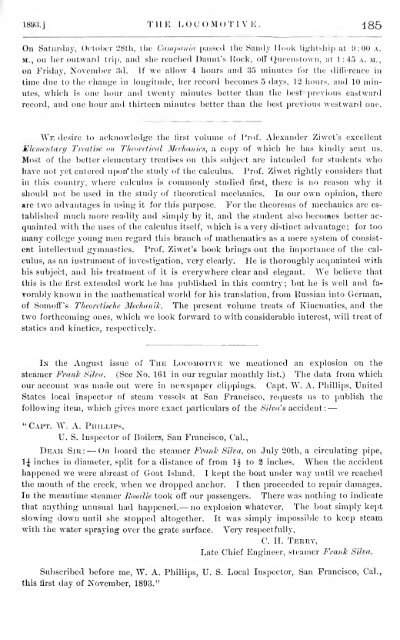The Locomotive - Lighthouse Survival Blog
The Locomotive - Lighthouse Survival Blog
The Locomotive - Lighthouse Survival Blog
You also want an ePaper? Increase the reach of your titles
YUMPU automatically turns print PDFs into web optimized ePapers that Google loves.
1893.] THE LOCOMOTIVE. 185<br />
On Saturday, OctoluT 28tli, the Campania passed the Saudy Hook lightsliip at i):00 a.<br />
M., on her outward trij), and slie reached Daunt's Kock, off (Jueenstown, at 1 : 45<br />
a. m.,<br />
on Friday, Novoiiil)er 3d. H we allow 4 hours and 35 minutes for the diflcrcnce ir*<br />
time due to the change in longitude, her record becomes 5 days, 12 liours, and 10 min-<br />
utes, which is one hour and twenty minutes better than the best previous eastward<br />
record, and one hour and thirteen minutes better than the best previous westward one.<br />
Wr desire to acknowledge the first volume of Prof. Alexander Ziwet's excellent<br />
Elementary Treatke on Thcuretical Mechanics, a copy of which he has kindly sent us.<br />
Most of the better elementiU'y treatises on this subject are intended for students who<br />
have not yet entered upon* the study of the calculus. Prof. Ziwet rightly considers that<br />
in this country, where calculus is commonly studied first, there is no reason why it<br />
sliould not be used in the study of theoretical mechanics. In our own opinion, there<br />
arc two advantages in using it for this purpose. For the theorems of mechanics are es-<br />
tablished much more readily and simply by it, and the student also becomes better ac-<br />
quainted with the uses of the calculus itself, which is a very distinct advantage; for too<br />
many college young men regard this branch of mathematics as a mere system of consist-<br />
ent intellectual gymnastics. Prof. Ziwet's book brings out the importance of the cal-<br />
culus, as an instrument of investigation, very clearly. He is thoroughly acquainted with<br />
his subject, and his treatment of it is everywhere clear and elegant. We believe that<br />
this is the first extended work he has published in this country; but he is well and fa-<br />
vorably known in the mathematical world for his translation, from Russian into German,<br />
of Somoff's <strong>The</strong>oretische MecJianilc. <strong>The</strong> present volume treats of Kinematics, and the<br />
two forthcoming ones, which we look forward to with considerable interest, will treat of<br />
statics and kinetics, respectively.<br />
In the August issue of <strong>The</strong> <strong>Locomotive</strong> we mentioned an explosion on the<br />
steamer Frank Silva. (See No. 161 in our regular monthly list.) <strong>The</strong> data from which<br />
our account was made out were in newspaper clippings. Capt. W. A. Phillips, United<br />
States local inspector of steam vessels at San Francisco, requests us to publish the<br />
following item, which gives more exact particulars of the Siha's accident :<br />
"Capt. W. A. Phillips,<br />
U. S. Inspector of Boilers, San Francisco, Cal.,<br />
On board the steamer Frank Silva, on July 30th, a circulating pipe,<br />
Deak Sih : —<br />
1| inches in diameter, split for a distance of from 1| to 2 inches. When the accident<br />
happened we were abreast of Goat Island. I kept the boat under way until we reached<br />
the mouth of the creek, when we dropped anchor. I then proceeded to repair damages.<br />
In the meantime steamer Rosalie took off our passengers. <strong>The</strong>re was nothing to indicate<br />
that anything unusual had happened,— no explosion whatever. <strong>The</strong> boat simply kept<br />
slowing down until she stopped altogether. It was simply impossible to keep steam<br />
with the water spraying over the grate surface. Very respectfully,<br />
C. H. Terry,<br />
—<br />
Late Chief Engineer, steamer Frank Silva.<br />
Subscribed before me, W. A. Phillips, U. S. Local Inspector, San Francisco, Cal.,<br />
this first day of November, 1893."
















